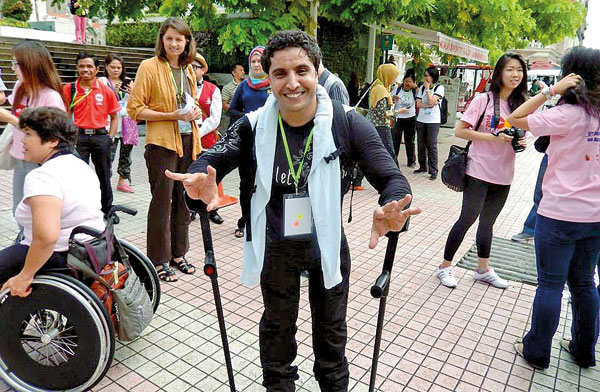Sunday Times 2
Empower differently-abled people to promote ‘tourism for inclusive growth’
The theme of the 2021 UNWTO World Tourism Day is ‘Tourism for Inclusive Growth.’ Inclusive growth has been defined as the “economic growth that is distributed fairly across society and creates opportunities for all” (UNDP, 2013). As the world marked the World Tourism Day on Monday, we need to think whether Sri Lanka tourism has been structured to deliver tourism’s benefits across different sectors in the country.

A differently abled Moroccan tour guide. Pic courtesy disabled-tourist-guide.com
As a pristine global destination, Sri Lanka needs to pay attention to inclusive growth in keeping with UNWTO (World Tourism Organisation) principles. Differently-abled people (DAPs) are an economically and socially disadvantaged vulnerable group. Therefore, it is vital to provide them with an adequate standard of living and basic income security. Tourism is one gateway through which the DAPs are empowered and given the wings to fly. However, there are no official records in Sri Lanka on DAPs participating in the tourism value chain except for few individual cases. Therefore, this short note discusses the challenges DAPs face when performing as tour guides and puts forward recommendations to increase their participation and performance in tour guiding.
One of the main challenges faced by DAP tourist guides is the inability to handle physically challenging activities since tour guiding involves walking many kilometers. DAP-friendly infrastructure, including special access to sites, sanitary facilities and resting places, are not available at many tourist sites in Sri Lanka. The public attitude towards the DAP is mainly sympathetic. This is another hindrance for the DAPs.
Sri Lankan tour operators and travel agents think that a DAP tour guide cannot perform the duties of a conventional tour guide. As a result, the DAP tour guides do not receive as many tours compared to other tour guides with no physical disabilities.
It has been noted that the DAPs in Sri Lanka try to avoid social interactions as much as possible. On the other hand, the conventional tourists believe that when they obtain the service of a guide, the guide should be with them all the time. Furthermore, some DAPs are suffering due to a lack of access to knowledge, and as a result, their awareness of the country, economy, politics, nature, and culture could be a little lower than an average person. This imposes major restrictions for the DAPs when performing as tour guides.
To encourage the DAPs’ participation in the tourism value chain, all social agents have to pay their roles with responsibility. These social agents include the public, private, and non-governmental bodies. Therefore, the following strategies are proposed to increase the DAP participation in the tourism value chain:
The National Tourism Organisation, Provincial Councils and local councils have to invest in accessibility, restrooms, and washroom development to cater to different demands of DAP tour guides. Further, wheelchair access, special driving/riding arrangements, and permissions need to be supplied.
Since there are different types of tour guides, the DAP tour guides can do guiding at a specific location, for example, closer to a key destination with the best view or at a museum where the wheelchair access is not restricted.
The DAP tour guides also can maintain their own websites, social media platforms to educate the potential tourists about their duties as DAP tourist guides. They can also invite the potential tourists to visit Sri Lanka and obtain the service of the DAP tour guides.
It is also suggested to form an association for the DAP tour guides through which the common issues faced by DAP tour guides can be addressed. Such an association can discuss with leading tour operators and travel agencies and secure a certain part of a tour.
DAP tour guides could be further encouraged by establishing an effective system whereby successful local and international DAP tour guides could be identified and invited to share their knowledge and experience.
To successfully conduct tours, DAP tourist guides need to be equipped with electric wheelchairs, advanced hearing aids, tabs/laptops, group communication facilities through short-wave technology within a tourist destination.
‘Voluntourism’ can be promoted with DAP tour guides. The volunteers who are visiting Sri Lanka could be assigned to one or more DAP tour guides at a destination, and they can support those tour guides when performing the duties. By being with DAP tour guides, volunteers will be able to increase their understanding of the nature, culture, heritage, history, and other aspects of a tourist destination.
Sri Lanka does not sufficiently promote international tourism for disabled tourists compared to other tourism destinations. Through promoting Sri Lanka among the disabled potential tourists, the DAPs will stand a good chance to serve as tour guides. On the other hand, the tourists with disabilities will have a better understanding of the physical condition of the tour guides and vice-versa. Therefore, proper mechanisms need to be implemented to promote Sri Lanka as a destination among tourists with disabilities.
Tourism is a social phenomenon that largely depends on public resources. DAPs are a vulnerable social group that needs pivotal attention. Therefore, tourism has to be a catalyst for encouraging, empowering, and making DAPs independent in our society. By doing so, we will be able to make the ‘Tourism for Inclusive Growth’ concept realistic in Sri Lanka.
(The writer is a senior
lecturer at the Faculty of Management Studies at the Rajarata University. He could be contacted at
manoj.susl@gmail.com)

